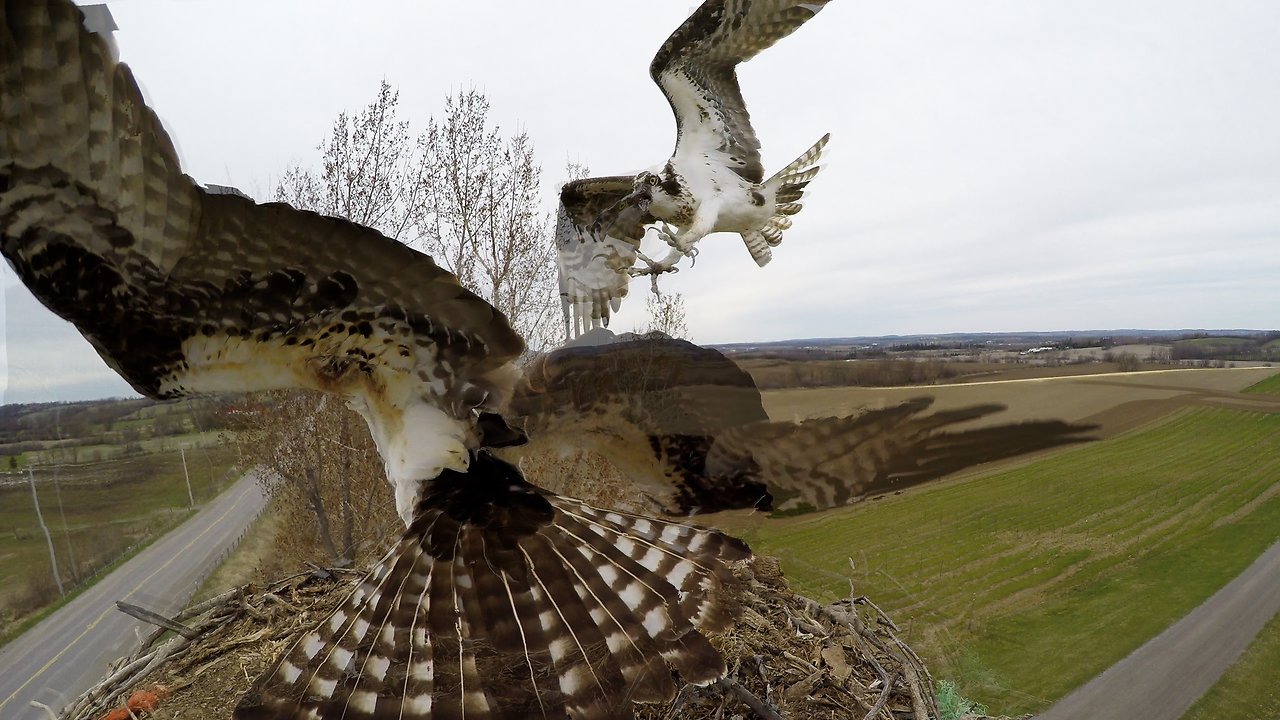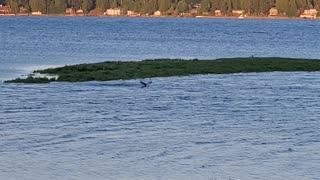Premium Only Content

Osprey viciously attacks another osprey over nesting site
Osprey, also known as fish eagles, are Canada's second largest bird. Only the bald eagle has a slightly longer wingspan than the osprey. They are ferocious predators, able to catch and carry off large fish that venture too close to the surface of the water. Their talons are razor sharp and they are barbed for holding onto their catch. These talons are not solely for gripping food. They are also used in self defense, which is a not uncommon during nesting season in the spring.
The osprey in the nest is the female in a nesting pair that have built this particular nest. They return to it each spring. They have rivalry from a nearby nesting pair that occasionally come to this nest to fight over food or to have a territorial fight. The lady of the house was watching with a keen eye while her mate was off gathering food at a lake nearly one kilometer away. Instead of her mate, she saw the approaching female of the rival pair. This female swooped in from the left, circle back and came at the female in the nest in a vicious attack from above. She had her talons open as she swooped and she closes them less than an inch away from the nesting female's neck and spine.
Thee female in the nest senses the attack and she drops low at the last second with lightning quick reflexes. It is a very near miss and it could have been fatal if she had not dodged just in time. As the attacking osprey skids past, the female in the nest launches herself to gain height. She must rise higher than her attacker to avoid the talons.
The attacking female swoops again with her claws out. The defending osprey actually flips over onto her back so that she can raise her own talons to defend herself. The attacker decides not to try again and she turns to fly back toward her own nest. The nesting female gives pursuit to run her off.
These fights are not unusual between birds of prey. Such squabbles ensure that hunting and nesting grounds are not over populated, as they encourage new arrivals or weaker pairs to seek a nesting site elsewhere.
-
 2:08
2:08
WildCreatures
1 month ago $1.74 earnedScuba Diver is Surrounded by Gigantic Green Sea Turtles
3.72K5 -
 0:48
0:48
ViralHog
4 years ago $0.58 earnedKing Snake Swallowing Another Snake
7.85K1 -
 0:26
0:26
Phantom18
3 years agoCash viciously attacks!
181 -
 0:21
0:21
pops3878
4 years agoOsprey nesting in Shubie Park
19 -
 9:07
9:07
The Art Of Nancy Cupp
3 years agoPainting Over Another Painting
39 -
 0:36
0:36
RusselldScott
3 years agoOsprey hunting
100 -
 1:16
1:16
thomasH2020
3 years agoCV-22 Osprey Over Treetops and Mountains
31 -
 42:38
42:38
Brewzle
1 day agoI Spent Too Much Money Bourbon Hunting In Kentucky
74K12 -
 1:15:30
1:15:30
World Nomac
20 hours agoMY FIRST DAY BACK in Manila Philippines 🇵🇭
57K9 -
 13:19
13:19
Dr David Jockers
1 day ago $10.86 earned5 Dangerous Food Ingredients That Drive Inflammation
76.5K17